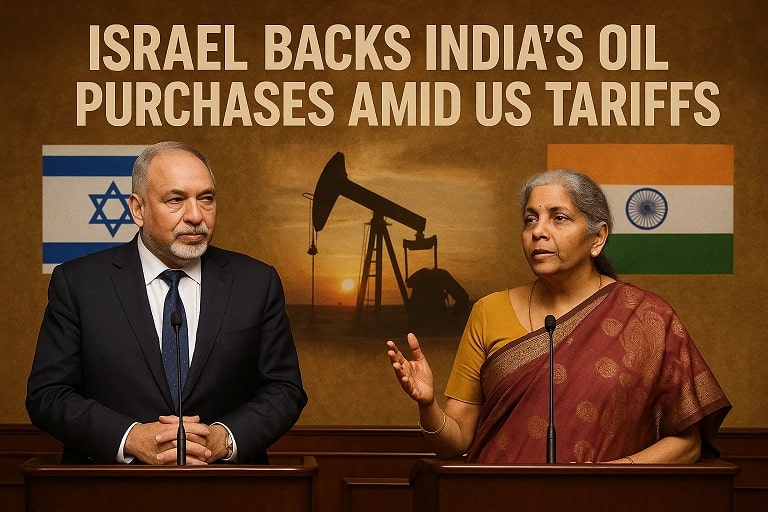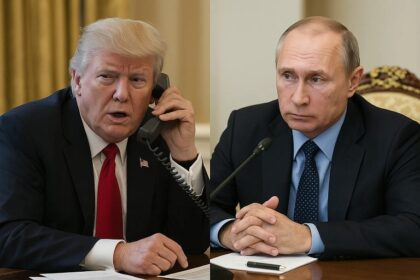Israel Backs India’s Russian Oil Purchases Amid US Tariffs: A Deep Dive into Geopolitical Trade Dynamics
In a bold show of diplomatic solidarity, Israel has publicly supported India’s continued purchases of Russian oil, even as the United States imposes steep tariffs on Indian imports. This development, unfolding on September 9, 2025, highlights the complex interplay of energy security, international sanctions, and bilateral relations in a multipolar world. As global tensions rise over Russia’s actions in Ukraine, India’s strategic energy decisions have drawn both criticism and backing from key allies. This comprehensive analysis explores the backstory, latest updates, economic impacts, future implications, and more surrounding this pivotal moment in international trade.
Why Israel’s Support for India’s Russian Oil Strategy Matters
Israel’s endorsement comes at a critical juncture, reaffirming the strong India-Israel partnership forged through defense, technology, and trade collaborations. By dismissing concerns over India’s Russian oil imports, Israel signals a pragmatic approach to energy needs, prioritizing economic stability over blanket adherence to Western sanctions. This stance not only bolsters India’s position but also underscores a growing divergence in global responses to the Russia-Ukraine conflict, where energy affordability trumps ideological alignments for many emerging economies.
Core Elements of the US-India Tariff Dispute
The US tariffs, announced by President Donald Trump in late August 2025, target most Indian exports with a 50% levy, explicitly linking the measure to India’s role as the largest buyer of discounted Russian crude. This punitive action aims to pressure New Delhi into curbing imports that indirectly fund Russia’s war efforts. Israel’s response, voiced by its Finance Minister during recent bilateral talks, emphasizes mutual negotiations with the US administration to mitigate these tariffs, while affirming no objections to India’s oil sourcing strategy.
Latest Events in the Israel-India-US Trade Tensions
Israel’s Finance Minister’s Statement on September 9, 2025
On September 9, 2025, Israel’s Finance Minister publicly backed India’s position, stating unequivocally that there is “no issue” with New Delhi’s Russian oil purchases. This came amid ongoing discussions between Israel and the US over tariff exemptions. The minister highlighted shared interests in protecting agricultural and energy sectors, positioning both nations as partners in navigating US trade policies.
Trump’s Tariff Imposition and India’s Defiant Response
Just weeks earlier, on August 27, 2025, President Trump imposed the 50% tariffs, criticizing India for “profiteering” from cheap Russian oil. India’s Finance Minister countered on September 5, 2025, vowing to continue imports despite the economic hit, citing energy security and affordability for its 1.4 billion citizens. This defiance has sparked retaliatory rhetoric, with India hinting at a “mega plan” to diversify trade partners.
Ukrainian President’s Endorsement of US Tariffs
Adding another layer, Ukrainian President Volodymyr Zelenskyy expressed support for the US tariffs on September 8, 2025, calling them a “right idea” to isolate Russia economically. Despite Ukraine’s reliance on Indian aid, Zelenskyy’s comments underscore the war’s polarizing effects on global alliances.
Russia’s Offer to Absorb Indian Exports
In a related development on August 20, 2025, Russia announced it would open its markets to Indian goods hit by US tariffs, promising to buy textiles, pharmaceuticals, and machinery. This move strengthens Indo-Russian ties, potentially offsetting some tariff damages.
Historical Context: Evolution of India-Russia Oil Trade and US Sanctions
India’s affinity for Russian oil dates back decades, rooted in Cold War-era non-alignment policies. Post-2022 Russia-Ukraine war, India’s imports surged from negligible levels to over 40% of its total crude needs by 2025, driven by discounted prices amid Western sanctions. The US, under Trump, has escalated pressure, viewing these purchases as undermining G7 efforts to starve Russia of revenue.
Israel’s involvement traces to its own energy diversification post-2023 Hamas conflict, where it ramped up imports from diverse sources, including Russia, while maintaining US alliances. The current backing reflects Israel’s balanced foreign policy, avoiding full alignment with US sanctions that could strain its economic ties with India.
Timeline of Key Events in US-India Tariff Saga
| Date | Event |
|---|---|
| August 8, 2025 | India pauses US arms purchases in response to impending tariffs. |
| August 20, 2025 | Russia offers to buy Indian exports affected by US tariffs. |
| August 27, 2025 | Trump imposes 50% tariffs on Indian imports, citing Russian oil purchases. |
| September 1, 2025 | Trump claims India offered zero tariffs on US goods in exchange for relief. |
| September 5, 2025 | India’s Finance Minister affirms continued Russian oil imports. |
| September 8, 2025 | Zelenskyy endorses US tariffs as leverage against Russia. |
| September 9, 2025 | Israel’s Finance Minister backs India and initiates joint US talks. |
Impacts of Israel’s Backing and US Tariffs on Global Trade
Economic Repercussions for India
The tariffs could cost India billions in export revenues, particularly in sectors like IT services, gems, and apparel, which form the bulk of US-bound shipments. However, Israel’s support may facilitate joint lobbying for exemptions, potentially softening the blow. India’s pivot to Russian markets could sustain growth, but rising oil prices from alternative sources pose inflation risks.
Geopolitical Shifts and Alliance Strains
Israel’s stance risks US ire but strengthens the India-Middle East corridor, enhancing trilateral ties. For the US, the tariffs signal a protectionist revival, alienating partners like India and complicating Ukraine aid efforts. Globally, this encourages other nations, like China and Turkey, to deepen Russian energy ties, fragmenting sanction efficacy.
Energy Market Volatility
India’s unwavering oil purchases stabilize discounted Russian crude flows, keeping global prices in check. Yet, prolonged tariffs might force India to seek pricier Middle Eastern or US supplies, contributing to energy inflation and supply chain disruptions.
Broader Implications for International Relations
This episode highlights the limits of US unilateralism, with Israel’s backing exemplifying how allies prioritize bilateral interests. It may accelerate de-dollarization trends, as India explores rupee-ruble trade with Russia.
Future Scopes: Navigating Trade Wars and Energy Transitions
Looking ahead, India and Israel could collaborate on renewable energy and tech transfers to reduce oil dependency, aligning with global net-zero goals by 2030. Joint negotiations with the US might yield tariff waivers if India moderates Russian imports or boosts American LNG purchases.
Russia’s deepened trade vows suggest a long-term Indo-Russian axis, potentially expanding to defense and BRICS frameworks. For the US, escalating tariffs could backfire, pushing India toward EU or Asian pacts. By 2026, expect multilateral forums like G20 to address sanction circumvention, fostering more equitable energy trade norms.
Potential Scenarios for 2026 and Beyond
- Optimistic Path: Successful India-Israel-US talks lead to tariff reductions and diversified energy deals.
- Pessimistic Path: Escalating trade wars prompt India to fully pivot to non-Western markets, weakening global sanctions.
- Balanced Outlook: Gradual de-escalation through WTO interventions, with India balancing Russian oil with green alternatives.
Frequently Asked Questions (FAQs)
Why is Israel supporting India’s Russian oil purchases?
Israel views India’s energy choices as a matter of national security and economic pragmatism, especially given its own diverse import strategies, and seeks to maintain strong bilateral ties amid shared US tariff challenges.
What are the US tariffs on Indian imports and why were they imposed?
The US levied 50% tariffs on most Indian goods starting August 27, 2025, as punishment for India’s heavy reliance on discounted Russian oil, which the US claims funds the Ukraine war.
Will India stop buying Russian oil due to these tariffs?
No, India’s Finance Minister stated on September 5, 2025, that the country will continue imports to ensure affordable energy supplies for its population and industries.
How might this affect global oil prices?
India’s sustained purchases help keep Russian crude flowing at discounts, stabilizing prices; any shift could spike costs worldwide, exacerbating inflation.
What role does Ukraine play in this dispute?
Ukrainian President Zelenskyy supported the tariffs on September 8, 2025, seeing them as a tool to economically isolate Russia, despite Ukraine’s aid dependencies.
Could Israel and India negotiate tariff relief with the US?
Yes, both nations are actively discussing exemptions, leveraging their strategic partnerships to argue for balanced trade policies.
What alternatives is India considering for energy?
India is exploring increased US LNG imports and accelerating solar/wind projects, but Russian oil remains cost-effective in the short term.
The Road Ahead: Balancing Alliances in a Fragmented World
Israel’s backing of India’s Russian oil strategy amid US tariffs exemplifies the nuanced diplomacy shaping 2025’s geopolitical landscape. As nations juggle sanctions, energy needs, and trade barriers, this saga could redefine global alliances, urging a shift toward multilateral solutions. For India, it’s a test of resilience; for the world, a reminder of interconnected economic fates.
Key Takeaways
- Diplomatic Solidarity: Israel’s support strengthens India-Israel ties against US pressures.
- Economic Resilience: India prioritizes affordable energy, eyeing Russian markets for tariff-hit exports.
- Global Ramifications: Tariffs may fragment trade blocs, accelerating multipolar shifts.
- Opportunities Ahead: Potential for green energy collaborations to mitigate future disputes.














